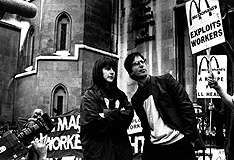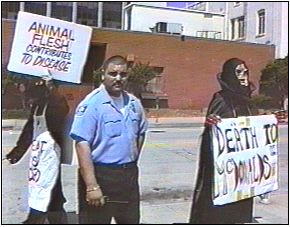|
The primary
reason why the trial has taken so long is because "the tables have been turned and the fast food giant has found itself on trial," as Steel and Morris said in a statement about the legal milestone.
To prove that they weren't guilty of libel, the activists have presented wide-ranging evidence about the corporation and its business practices, including:
Animal Cruelty
Despite a McDonald's publication that claimed the corporation only used suppliers
with the highest standards of animal welfare, testimony from McDonald's own expert witness provided apparent contradictions. At facilities of the British company which supplies McDonald's with 27 million chickens in Europe each year, for example, fewer than 1 bird in 3 has normal leg structure because of the cramped conditions. And despite
having huge potential influence over this supplier, McDonald's only
stipulated that the birds should have a 'good meat yield,' never once
suggesting better welfare, according to the defendants.
Unhealthy food
Besides plans for a heart-stopping "Mega Mac" with four meat patties, a 1986 McDonald's internal memo supposedly read: "We can't really
address or defend nutrition. We don't sell nutrition and people don't come
to McDonald's for nutrition." Asked why he thought Coca-Cola was an example of nutritious food, a U.S. Senior-Vice President of Marketing testified it is "providing water, and I think that is part of a balanced diet."
(A listing of nutritional content is available directly from McDonald's, but curiously overlooks newer high-fat items, such as the "Arch Deluxe.")
Food poisoning
A McDonald's witness testified that the company receives between 1,500 and 2,750 customer complaints of food
poisoning a year in the UK, and the defendants charged that McDonald's sacrifices "safety concerns to make a speedy product." Claiming that McDonald's own specification for cooking temperature
had increased about three times in the UK during the last ten years, the activists said the meat still
didn't reach the levels recommended for safety.
Rainforest exploitation
McDonald's obtains beef from Brazilian ranches on recently cleared Amazonian rainforest land, according to the activists. (The company maintains that U.S. stores use 100 percent American beef, and restauants in other countries try to use local animals as well.)
Manipulation of Children
According to evidence submitted by the pair, the corporation's official 'Operations Manual' states: "Ronald loves McDonald's and McDonald's food. And so do children,
because they love Ronald. Remember, children exert a phenomenal influence
when it comes to restaurant selection. This means you should do everything
you can to appeal to children's love for Ronald and McDonald's."
Other issues raised by the activists include wasteful packaging and poor working conditions. Steel and Morris also charge that the corporation hired private cops to infiltrate London Greenpeace, with some of the undercover agents distributing the supposedly libelous pamphlet.
|  Dave Morris and Helen Steel -- often referred to as the "McLibel 2" -- are British vegetarian activists who were sued by McDonald's in 1990. The corporation claims that the pair distributed leaflets containing false statements about the company, its products and practices. The pamphlets were published by London Greenpeace.
Dave Morris and Helen Steel -- often referred to as the "McLibel 2" -- are British vegetarian activists who were sued by McDonald's in 1990. The corporation claims that the pair distributed leaflets containing false statements about the company, its products and practices. The pamphlets were published by London Greenpeace.
